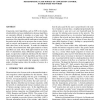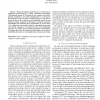1394 search results - page 17 / 279 » On performance limitations of congestion control |
INFOCOM
2002
IEEE
14 years 12 days ago
2002
IEEE
– Typically, NACK-based congestion control is dismissed as being not viable due to the common notion that “open-loop” congestion control is simply “difficult.” Emerging r...
WSC
2001
13 years 8 months ago
2001
Congestion control algorithms, such as TCP or the closelyrelated additive increase-multiplicative decrease algorithms, are extremely difficult to simulate on a large scale. The re...
ISCC
2006
IEEE
14 years 1 months ago
2006
IEEE
Network resource management and control is a complex problem that requires robust, possibly intelligent, control methodologies to obtain satisfactory performance. While many Activ...
COMCOM
2010
13 years 7 months ago
2010
We study the interaction between the MIMD (Multiplicative Increase Multiplicative Decrease) congestion control and a bottleneck router with Drop Tail buffer. We consider the probl...
GRID
2005
Springer
14 years 1 months ago
2005
Springer
— QoS and congestion performance are crucial to good application performance in a utility computing environment. Unfortunately, proper IP QoS setup is very complex and is either ...


